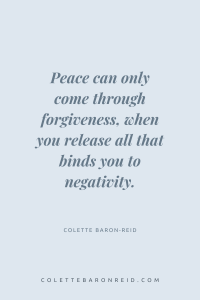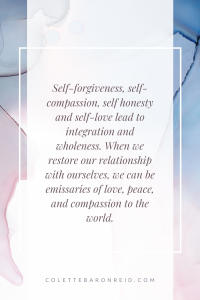In February, our attention is often pulled to thoughts of love and romance, including heart-shaped boxes of chocolates, candlelit dinners, and dozens of roses from a partner who adores us. But while romantic relationships can make our hearts beat a wild tango (and are a delightful facet of our human existence!) here’s what I know to be true:
You can only love another to the extent you love yourself.
And self-love is rooted in self-forgiveness. Generosity of the heart, reverence, respect, and empathy for all living things bring you profound power to live a life of happiness and contentment. And that includes generosity, empathy, and compassion for yourself!
Contentment Arises from Compassion
When someone else hurts us, we naturally create emotional distance. We want to protect ourselves from future hurts by keeping our guard up, not getting too close for fear we’ll be hurt again. Add on the weight of unresolved anger and resentment, and it’s not surprising that you feel disconnected from another.
The same is true for our relationship with ourselves. When we judge ourselves harshly or hold onto resentments, we create a disconnect within our soul. We cannot reject a portion of ourselves and still live at peace with others.
Look at the world around us right now. It is so easy to see how the lack of forgiveness feeds the turmoil and suffering as cycles of hurts and resentment play out in what seems like a never-ending spiral.
Now imagine the same divisiveness within your own heart. By keeping your self-directed resentment, and shame alive, you’re restricting your ability to feel, give, and accept love.
There is no room in the sacred vessel of your heart for compassion and love if it is full of anger and shame!
Forgiveness is the key to freedom and peace . . . and it starts with you.
Why Compassion for Yourself Will Release You
Many of us have spent our lives collecting hurts and grievances — and the longest list is often those we ourselves have committed! Even when we’re open-hearted to those who have wronged us and move quickly to excuse and forgive them, we can be absolute ogres to ourselves.
We keep a running tally of all our flaws and mistakes:
The people we’ve hurt.
The mistakes we’ve made.
The trust we’ve broken…
And if you’re swimming in that pond already you may think everything is your fault so you may lack discernment when it comes to others who project their resentments on to you. This can get very sticky and compounds into an unnecessary burden for you to feel even worse.
Trust me, as a recovering addict, it’s easy to create a long list of missteps I’ve made!
It is an important part of our journey to review our mistakes and make amends where possible and to avoid taking on what others project. This is why it’s so important to know what is yours to work through with rigorous self honesty and then release the feelings of judgment, shame, which at their core are low self worth and esteem.
 Resentment and anger are emotions that actually bind you and hook you to the events that cause your suffering, keeping them alive inside you, draining you of your life force and inner light. Peace can only come through forgiveness, when you release all that binds you to negativity.
Resentment and anger are emotions that actually bind you and hook you to the events that cause your suffering, keeping them alive inside you, draining you of your life force and inner light. Peace can only come through forgiveness, when you release all that binds you to negativity.
You’re not ignoring the hurts you caused or received. You’re honoring them, receiving their message, and releasing them so you can continue your sacred journey towards wholeness. Forgiveness is about restoration, making whole that which has been broken.
And when you are restored and at peace with yourself, you can be at peace with others!
How to Forgive Yourself
Now you might be saying, “Colette, that sounds amazing. But HOW do I forgive myself?”
In my experience nothing changes without self honesty. Self forgiveness must begin with an inventory. This is your way to be accountable to the shift you are trying to make. First admit this is yours to heal. Take your time with this and remember Love is the only answer.
Journaling can be an incredibly healing sacred practice for self-forgiveness. Here are some questions to guide your journaling practice:
-
- What do I resent myself for? Write a list that includes situations, past traumas, judgments, areas where you feel you aren’t enough, etc.
- Does it feel good to feel resentful or angry at myself? (Note: I know that may sound like an unusual question, but I want to encourage you to evaluate if the energy you exert to be resentful outweighs the benefits of the resentment.)
- If resentment doesn’t make me feel good or free or joyful, how would I rather feel?
- How would I feel if I were able to set down some of this self-recrimination and guilt?
Self-Forgiveness Ritual
Now, here’s a simple self-forgiveness ritual you can practice to lay down the heavy burdens of guilt, shame, and self-recrimination so you can experience wholeness, freedom and love.
- Find a comfortable, quiet place to sit with your feet on the floor.
- Close your eyes and breathe deeply, allowing your body to relax.
- When ready, allow your mind to return to something in your past about which you are still feeling shame or guilt. Don’t try to force it; just let it gently come into your consciousness. Perhaps you will see it appear on the screen of your mind, or maybe you will hear voices, or feel sensations. Don’t judge what you are experiencing; simply note it and continue to breathe deeply.
- If you note tension in your body, imagine a warm beam of light traveling from the crown of your head to the affected area. When the light arrives to the point of tightness, imagine warmth and healing energy penetrating this area with a golden glow.
- Now, take five deep inhales and exhales. As you inhale, say to yourself, “I accept forgiveness.” On your exhale, say, “I release all anger and negativity.” If you feel resistance, don’t fight it. Again, simply notice the sensation and continue to breathe.
- If you feel moved to do so, repeat this exercise with another memory of something you’re holding onto and judging yourself for.
- When you feel complete, take three more deep breaths, and then open your eyes.
You can repeat this ritual of self-love as often as you like.
Be gentle with yourself; you may be surprised to discover all the areas you’ve been holding anger or guilt! Remember, this is a practice, something you can return to again and again. Over time, you’ll sense that you’ve set down the heavy burdens of shame and self-judgment.
 We practice self-forgiveness so that we can be active parts of spreading peace and beauty. Self-forgiveness, self-compassion, self honesty and self-love lead to integration and wholeness. When we restore our relationship with ourselves, we can be emissaries of love, peace, and compassion to the world.
We practice self-forgiveness so that we can be active parts of spreading peace and beauty. Self-forgiveness, self-compassion, self honesty and self-love lead to integration and wholeness. When we restore our relationship with ourselves, we can be emissaries of love, peace, and compassion to the world.
Love’s greatest creative power is ignited by the conscious action of compassion. Be gentle and compassionate with yourself; allow yourself to forgive YOU, just as much as another.

